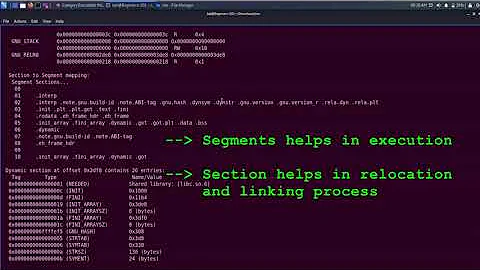Reading the contents of an ELF file (programmatically)
You should probably be using the Pheaders, not the Sheaders. There's usually far fewer of them, and they correspond directly to pieces of the file that get mapped into memory by the kernel's ELF loader. I'm forced to use the contents of /usr/include/elf.h in the following, as you example doesn't include Elf64_Phdr definitions.
Elf64_Off p_offset; /* Segment file offset */
Elf64_Xword p_filesz; /* Segment size in file */
Those two elements of the Elf64_Phdr for the PT_LOAD segments get you index into the file and the bytes that get mapped. The correspondence between .text segment header and the PT_LOAD Phdr always seemed a bit loose to me. If you want the executable code, you have to look at the p_flags element of Elf64_Phdr structs - the .text segment is marked PF_X, and the .data segment is not.
A while back, I updated the "userland exec". Looking at this code might help you understand, or it might just be confusing.
Related videos on Youtube
Sebi
Updated on September 18, 2022Comments
-
Sebi over 1 year
I am trying to retrieve the contents of an additional section within an ELF binary. At this point, I'm using the following code to retrieve the name of each section:
#include <stdio.h> #include <unistd.h> #include <stdint.h> #include <stdlib.h> #pragma pack(push,1) #pragma pack(pop) #define EI_NIDENT 16 /* 32-bit ELF base types. */ typedef unsigned int Elf32_Addr; typedef unsigned short Elf32_Half; typedef unsigned int Elf32_Off; typedef signed int Elf32_Sword; typedef unsigned int Elf32_Word; /* 64-bit ELF base types. */ typedef unsigned long long Elf64_Addr; typedef unsigned short Elf64_Half; typedef signed short Elf64_SHalf; typedef unsigned long long Elf64_Off; typedef signed int Elf64_Sword; typedef unsigned int Elf64_Word; typedef unsigned long long Elf64_Xword; typedef signed long long Elf64_Sxword; typedef struct elf32_hdr{ unsigned char e_ident[EI_NIDENT]; Elf32_Half e_type; Elf32_Half e_machine; Elf32_Word e_version; Elf32_Addr e_entry; /* Entry point */ Elf32_Off e_phoff; Elf32_Off e_shoff; Elf32_Word e_flags; Elf32_Half e_ehsize; Elf32_Half e_phentsize; Elf32_Half e_phnum; Elf32_Half e_shentsize; Elf32_Half e_shnum; Elf32_Half e_shstrndx; } Elf32_Ehdr; typedef struct elf32_shdr { Elf32_Word sh_name; Elf32_Word sh_type; Elf32_Word sh_flags; Elf32_Addr sh_addr; Elf32_Off sh_offset; Elf32_Word sh_size; Elf32_Word sh_link; Elf32_Word sh_info; Elf32_Word sh_addralign; Elf32_Word sh_entsize; } Elf32_Shdr; typedef struct elf64_hdr { unsigned char e_ident[EI_NIDENT]; /* ELF "magic number" */ Elf64_Half e_type; Elf64_Half e_machine; Elf64_Word e_version; Elf64_Addr e_entry; /* Entry point virtual address */ Elf64_Off e_phoff; /* Program header table file offset */ Elf64_Off e_shoff; /* Section header table file offset */ Elf64_Word e_flags; Elf64_Half e_ehsize; Elf64_Half e_phentsize; Elf64_Half e_phnum; Elf64_Half e_shentsize; Elf64_Half e_shnum; Elf64_Half e_shstrndx; } Elf64_Ehdr; typedef struct elf64_shdr { Elf64_Word sh_name; /* Section name, index in string tbl */ Elf64_Word sh_type; /* Type of section */ Elf64_Xword sh_flags; /* Miscellaneous section attributes */ Elf64_Addr sh_addr; /* Section virtual addr at execution */ Elf64_Off sh_offset; /* Section file offset */ Elf64_Xword sh_size; /* Size of section in bytes */ Elf64_Word sh_link; /* Index of another section */ Elf64_Word sh_info; /* Additional section information */ Elf64_Xword sh_addralign; /* Section alignment */ Elf64_Xword sh_entsize; /* Entry size if section holds table */ } Elf64_Shdr; int main(int argc, char **argv) { FILE* ElfFile = NULL; char* SectNames = NULL; Elf64_Ehdr elfHdr; Elf64_Shdr sectHdr; uint32_t idx; if(argc != 2) { printf("usage: %s <ELF_FILE>\n", argv[0]); exit(1); } if((ElfFile = fopen(argv[1], "r")) == NULL) { perror("[E] Error opening file:"); exit(1); } // read ELF header, first thing in the file fread(&elfHdr, 1, sizeof(Elf64_Ehdr), ElfFile); // read section name string table // first, read its header. /* e_shoff This member holds the section header table's file offset in bytes. If the file has no section header table, this member holds zero. e_shstrndx This member holds the section header table index of the entry associated with the section name string table. If the file has no section name string table, this member holds the value SHN_UNDEF. If the index of section name string table section is larger than or equal to SHN_LORESERVE (0xff00), this member holds SHN_XINDEX (0xffff) and the real index of the section name string table section is held in the sh_link member of the initial entry in section header table. Otherwise, the sh_link member of the initial entry in section header table contains the value zero. SHN_UNDEF This value marks an undefined, missing, irrelevant, or otherwise meaningless section reference. For example, a symbol "defined" relative to section number SHN_UNDEF is an undefined symbol. SHN_LORESERVE This value specifies the lower bound of the range of reserved indices. SHN_LOPROC Values greater than or equal to SHN_HIPROC are reserved for processor-specific semantics. SHN_HIPROC Values less than or equal to SHN_LOPROC are reserved for processor-specific semantics. SHN_ABS This value specifies absolute values for the corresponding reference. For example, symbols defined relative to section number SHN_ABS have absolute values and are not affected by relocation. SHN_COMMON Symbols defined relative to this section are common symbols, such as Fortran COMMON or unallocated C external variables. SHN_HIRESERVE This value specifies the upper bound of the range of reserved indices between SHN_LORESERVE and SHN_HIRESERVE, inclusive; the values do not reference the section header table. That is, the section header table does not contain entries for the reserved indices. */ fseek(ElfFile, elfHdr.e_shoff + elfHdr.e_shstrndx * sizeof(sectHdr), SEEK_SET); fread(§Hdr, 1, sizeof(sectHdr), ElfFile); /* sh_size This member holds the section's size in bytes. Unless the section type is SHT_NOBITS, the section occupies sh_size bytes in the file. A section of type SHT_NOBITS may have a nonzero size, but it occupies no space in the file. sh_offset This member's value holds the byte offset from the beginning of the file to the first byte in the section. One section type, SHT_NOBITS, occupies no space in the file, and its sh_offset member locates the conceptual placement in the file. e_shnum This member holds the number of entries in the section header table. Thus the product of e_shentsize and e_shnum gives the section header table's size in bytes. If a file has no section header table, e_shnum holds the value of zero. If the number of entries in the section header table is larger than or equal to SHN_LORESERVE (0xff00), e_shnum holds the value zero and the real number of entries in the section header table is held in the sh_size member of the initial entry in section header table. Otherwise, the sh_size member of the initial entry in the section header table holds the value zero. sh_name This member specifies the name of the section. Its value is an index into the section header string table section, giving the location of a null-terminated string. */ // next, read the section, string data // printf("sh_size = %llu\n", sectHdr.sh_size); SectNames = malloc(sectHdr.sh_size); fseek(ElfFile, sectHdr.sh_offset, SEEK_SET); fread(SectNames, 1, sectHdr.sh_size, ElfFile); // read all section headers for (idx = 0; idx < elfHdr.e_shnum; idx++) { const char* name = ""; fseek(ElfFile, elfHdr.e_shoff + idx * sizeof(sectHdr), SEEK_SET); fread(§Hdr, 1, sizeof(sectHdr), ElfFile); // print section name if (sectHdr.sh_name); name = SectNames + sectHdr.sh_name; printf("%2u %s\n", idx, name); } return 0; }Running readelf on a "hello world" binary produces the following output:
$ readelf -S helloworld There are 30 section headers, starting at offset 0x1170: Section Headers: [Nr] Name Type Address Offset Size EntSize Flags Link Info Align [ 0] NULL 0000000000000000 00000000 0000000000000000 0000000000000000 0 0 0 [ 1] .interp PROGBITS 0000000000400238 00000238 000000000000001c 0000000000000000 A 0 0 1 [ 2] .note.ABI-tag NOTE 0000000000400254 00000254 0000000000000020 0000000000000000 A 0 0 4 [ 3] .note.gnu.build-i NOTE 0000000000400274 00000274 0000000000000024 0000000000000000 A 0 0 4 [ 4] .gnu.hash GNU_HASH 0000000000400298 00000298 000000000000001c 0000000000000000 A 5 0 8 [ 5] .dynsym DYNSYM 00000000004002b8 000002b8 0000000000000060 0000000000000018 A 6 1 8 [ 6] .dynstr STRTAB 0000000000400318 00000318 000000000000003d 0000000000000000 A 0 0 1 [ 7] .gnu.version VERSYM 0000000000400356 00000356 0000000000000008 0000000000000002 A 5 0 2 [ 8] .gnu.version_r VERNEED 0000000000400360 00000360 0000000000000020 0000000000000000 A 6 1 8 [ 9] .rela.dyn RELA 0000000000400380 00000380 0000000000000018 0000000000000018 A 5 0 8 [10] .rela.plt RELA 0000000000400398 00000398 0000000000000048 0000000000000018 A 5 12 8 [11] .init PROGBITS 00000000004003e0 000003e0 000000000000001a 0000000000000000 AX 0 0 4 [12] .plt PROGBITS 0000000000400400 00000400 0000000000000040 0000000000000010 AX 0 0 16 [13] .text PROGBITS 0000000000400440 00000440 0000000000000182 0000000000000000 AX 0 0 16 [14] .fini PROGBITS 00000000004005c4 000005c4 0000000000000009 0000000000000000 AX 0 0 4 [15] .rodata PROGBITS 00000000004005d0 000005d0 0000000000000013 0000000000000000 A 0 0 4 [16] .eh_frame_hdr PROGBITS 00000000004005e4 000005e4 0000000000000034 0000000000000000 A 0 0 4 [17] .eh_frame PROGBITS 0000000000400618 00000618 00000000000000f4 0000000000000000 A 0 0 8 [18] .init_array INIT_ARRAY 0000000000600e10 00000e10 0000000000000008 0000000000000000 WA 0 0 8 [19] .fini_array FINI_ARRAY 0000000000600e18 00000e18 0000000000000008 0000000000000000 WA 0 0 8 [20] .jcr PROGBITS 0000000000600e20 00000e20 0000000000000008 0000000000000000 WA 0 0 8 [21] .dynamic DYNAMIC 0000000000600e28 00000e28 00000000000001d0 0000000000000010 WA 6 0 8 [22] .got PROGBITS 0000000000600ff8 00000ff8 0000000000000008 0000000000000008 WA 0 0 8 [23] .got.plt PROGBITS 0000000000601000 00001000 0000000000000030 0000000000000008 WA 0 0 8 [24] .data PROGBITS 0000000000601030 00001030 0000000000000010 0000000000000000 WA 0 0 8 [25] .bss NOBITS 0000000000601040 00001040 0000000000000008 0000000000000000 WA 0 0 1 [26] .comment PROGBITS 0000000000000000 00001040 0000000000000024 0000000000000001 MS 0 0 1 [27] .shstrtab STRTAB 0000000000000000 00001064 0000000000000108 0000000000000000 0 0 1 [28] .symtab SYMTAB 0000000000000000 000018f0 0000000000000618 0000000000000018 29 45 8 [29] .strtab STRTAB 0000000000000000 00001f08 000000000000023c 0000000000000000 0 0 1 Key to Flags: W (write), A (alloc), X (execute), M (merge), S (strings), l (large) I (info), L (link order), G (group), T (TLS), E (exclude), x (unknown) O (extra OS processing required) o (OS specific), p (processor specific)Examining the following entry:
[13] .text PROGBITS 0000000000400440 00000440 0000000000000182 0000000000000000 AX 0 0 16in order to retrieve the .text section entirely from the binary is it sufficient to read 0x182 to bytes from the address 0x400440 + 0x440 from the file, where 0x182 is the section size and 0x400440 is the address and 0x440 is the offset? Also, what is the role of the alignment(0x16) here?
-
Wyzard about 9 yearsConsider using the BFD library instead of implementing the ELF format yourself.
-
 peterh about 9 yearsYour question was closed unfairly, unfortunately it is not uncommon here. I suggest a next try on stackoverflow.com, maybe people there won't be so hostile as here.
peterh about 9 yearsYour question was closed unfairly, unfortunately it is not uncommon here. I suggest a next try on stackoverflow.com, maybe people there won't be so hostile as here. -
Sebi about 9 years@peterh I did. Here is the answer: stackoverflow.com/questions/29052125/…
-






